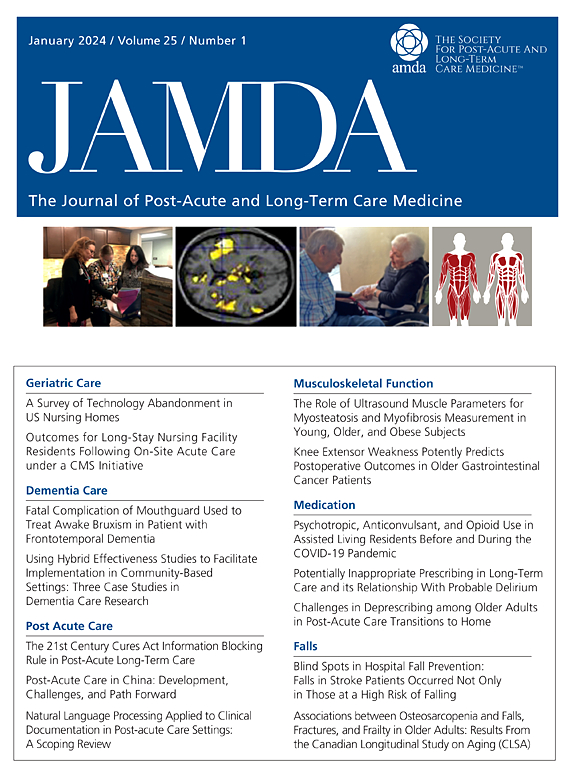What do Professionals Think of Specific Care Recommendations for Vascular Cognitive Impairment? A Delphi Study With Health Care Professionals
IF 4.2
2区 医学
Q2 GERIATRICS & GERONTOLOGY
Journal of the American Medical Directors Association
Pub Date : 2025-03-25
DOI:10.1016/j.jamda.2025.105546
引用次数: 0
Abstract
Objectives
Vascular cognitive impairment (VCI) is an umbrella term covering all cognitive impairment from mild cognitive deficits to dementia due to vascular etiologies. VCI is highly prevalent within dementia and stroke care pathways, but specific recommendations for care for people with VCI are lacking. Therefore, we formulated specific recommendations for care for people with VCI and tested these in a panel of health care professionals.
Design
Modified Delphi study.
Setting and Participants
Purposefully sampled health care professionals in the dementia and stroke fields.
Methods
Based on Dutch care standards for dementia and stroke and previous studies, the research team formulated 27 statements. In 3 rounds, participants were asked on a 4-point Likert scale how much they agreed with statements. They could elaborate on their answer in open fields. After each round, level of agreement was calculated. Subsequently, it was evaluated whether consensus was reached. Qualitative data guided potential modifications to the statements and was analyzed for overarching themes in argumentation.
Results
Thirty-four participants (primary and secondary care physicians, nurses, psychologists, occupational therapists, and case managers in dementia care) were included in the expert panel. Of the formulated statements, 23 were accepted after 3 rounds. Accepted statements included recommendations on recognition and management of specific symptoms, awareness of care opportunities in and collaboration between care pathways and networks, and the importance of timely care. Some nuancing comments were raised on feasibility and specificity of the recommendations.
Conclusions and Implications
Experts agreed on multiple specific recommendations for VCI care across the patient journey, balancing specific and targeted care with further integration of the different care networks. Despite some concerns on feasibility and the balance between disease-centered and person-centered care, the expert-agreed statements can provide guidance in striving toward tailored care and aid in bringing together stroke and dementia networks for people with VCI.
求助全文
约1分钟内获得全文
求助全文
来源期刊
CiteScore
11.10
自引率
6.60%
发文量
472
审稿时长
44 days
期刊介绍:
JAMDA, the official journal of AMDA - The Society for Post-Acute and Long-Term Care Medicine, is a leading peer-reviewed publication that offers practical information and research geared towards healthcare professionals in the post-acute and long-term care fields. It is also a valuable resource for policy-makers, organizational leaders, educators, and advocates.
The journal provides essential information for various healthcare professionals such as medical directors, attending physicians, nurses, consultant pharmacists, geriatric psychiatrists, nurse practitioners, physician assistants, physical and occupational therapists, social workers, and others involved in providing, overseeing, and promoting quality

 求助内容:
求助内容: 应助结果提醒方式:
应助结果提醒方式:


